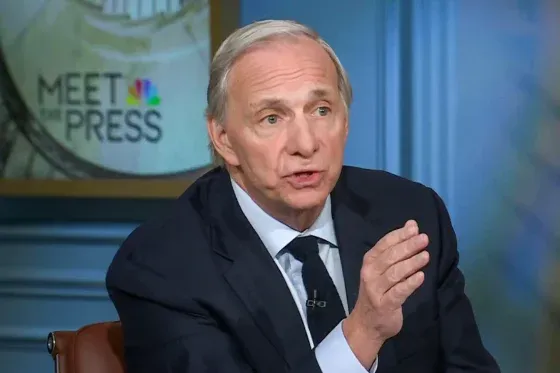Ray Dalio Warns of Monetary Order Breakdown as Bitcoin and Crypto Offer Alternatives

Earlier today, billionaire investor Ray Dalio issued a stark warning about the state of the global financial system during an interview on NBC's Meet the Press. The founder of Bridgewater Associates, known for his accurate prediction of the 2008 financial crisis, expressed concerns that go beyond a typical economic downturn.
Dalio highlighted that the world is facing a potential collapse of the monetary order, a system that has underpinned international trade and finance since the mid-20th century. He pointed to escalating U.S. debt, recent tariffs imposed by President Donald Trump on China, and deepening geopolitical tensions as key factors driving this instability. This breakdown, he cautioned, could lead to consequences far more severe than a recession, potentially reshaping the global economic landscape.
Dalio's warning comes at a time when the U.S. economy is already showing signs of strain, with trade tensions exacerbating financial market volatility, including the crypto market. The International Monetary Fund’s 2025 World Economic Outlook projects global growth at a modest 3.3%, with downside risks looming due to inflationary pressures and financial instability. These concerns align with Dalio’s view that systemic issues, such as the growing U.S. debt and political polarization, are creating a "once-in-a-lifetime" shift in monetary, political, and geopolitical orders. He emphasized that while tariffs are a visible trigger, they are merely one part of a broader unraveling of the cooperative framework that has maintained global economic stability for decades.
Crypto solves this. It’s time to start using it! pic.twitter.com/KhtUieFg0N
— DΛVID (@DavidShares) April 13, 2025
Could Bitcoin Emerge as a Viable Alternative
Amid this uncertainty, discussions about alternative currencies like Bitcoin have gained traction. Some experts speculate that Bitcoin’s decentralized nature and fixed supply could position it as a potential competitor to the U.S. dollar if the current monetary system falters.
Unlike the dollar, which is managed by the Federal Reserve and subject to inflationary pressures, Bitcoin operates on a blockchain free from government control, offering a neutral store of value. This decentralized structure has led to suggestions that Bitcoin could serve as a "digital gold" in a new financial order, particularly for nations seeking to bypass dollar-based sanctions or hedge against inflation.
However, Bitcoin is just one of many cryptocurrency alternatives that could play a role in a shifting monetary landscape. Ethereum and Solana, for instance, are gaining attention for their smart contract capabilities, which enable the creation of decentralized applications and facilitate complex financial transactions. Ethereum has long been a leader in this space, though it struggles with network congestion and high fees, while Solana offers faster transaction speeds but has faced criticism for its reliability. Meanwhile, stablecoins like Tether and USDC have been gaining popularity, especially in political and regulatory discussions, due to their pegging to the U.S. dollar, which provides price stability, and their potential to be regulated, making them a more palatable option for governments and institutions.
Additionally, privacy coins such as Monero and Zano appeal to individuals prioritizing anonymity, with features like ring signatures and stealth addresses ensuring untraceable transactions. Despite these advantages, each cryptocurrency faces its own challenges. As the global monetary system faces potential upheaval, the diversity of cryptocurrencies offers multiple pathways for innovation, though their ability to compete with or replace the dollar remains uncertain.
Dalio’s comments have sparked widespread debate, with some seeing his warning as a call to prepare for a fundamental shift in how the world manages money and trade. As the global economy navigates these turbulent waters, the possibility of a new monetary system, whether involving cryptocurrencies or other something else, remains an open question. For now, Dalio’s insights serve as a sobering reminder of the fragility of the current financial order.

